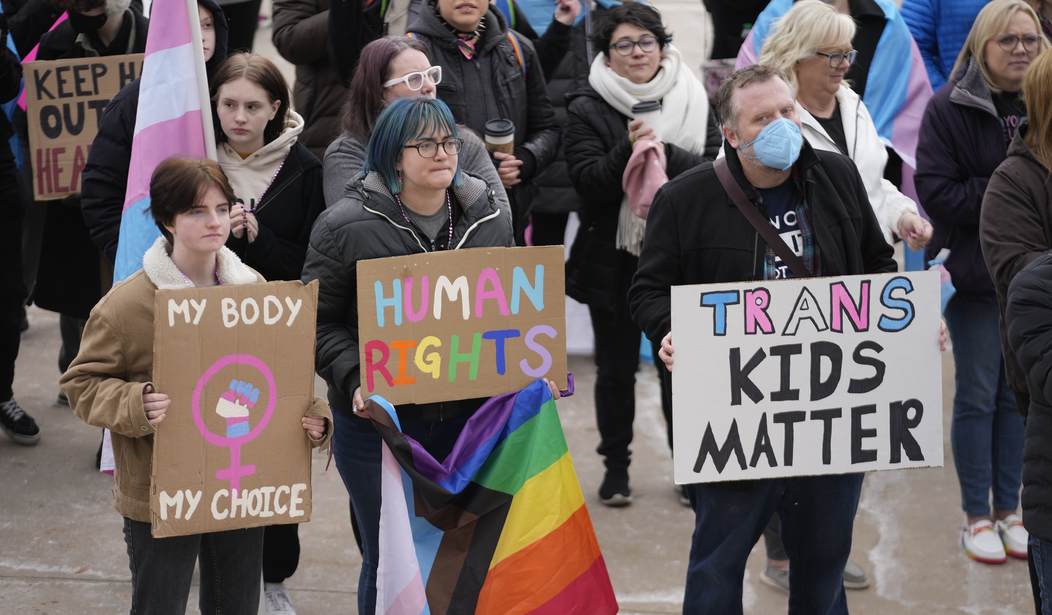The opinions expressed by contributors are their own and do not necessarily represent the views of RedState.com.
The National Institute of Health (NIH) funded a new study published in the New England Journal of Medicine (NEJM) in which researchers studied the impact of using experimental hormones on children exhibiting symptoms of gender dysphoria. The study, which was published on Jan. 19, followed transgender-identifying youth over two years of using the hormone treatments. It examined 315 young people between the ages of 12 and 20. Each participant identified as either “transgender” or “non-binary.”
One of the objectives of the study was to determine the impact of hormone treatments on the mental health of young people suffering from gender dysphoria. Regrettably, two of the young research subjects ended up taking their own lives later on.
The Christian Post’s Brandon Showalter wrote:
As is the case with everything in the transgender world, the grisly reality of what’s happening is obfuscated with deceptive lingo. The article is littered with gender euphemisms in addition to being full of dense and technical medical language, which lay people struggle to comprehend. This provides the gender ideologue doctors with a seemingly sophisticated cover, as though we do not know what they are really doing: conducting heinous medical experiments on children.
Most appallingly, on page 243 of the NEJM (and in a chart on page 245), these two tragic suicides are casually documented and reduced to mere “adverse events.” Young people who were being experimented on died by suicide and all they can manage to say is “Oops!”
Predictably, the researchers who conducted the study found that applying these treatments to young people generated positive outcomes when it comes to mental health and suicide. However, similar to other types of studies, this one has some issues that raise more questions than answers.
Journalist Jesse Singal, who has covered these matters extensively, wrote a piece on his Substack in which he provides a thorough breakdown of the study and points out some of its flaws. He notes that the researchers’ hypothesis was that “patients treated with gender-affirming hormones will exhibit decreased symptoms of anxiety and depression, gender dysphoria, self-injury, trauma symptoms, and suicidality and increase body esteem and quality of life over time.”
However, Singal noted that it appeared the researchers may have left out some data that might not have been favorable to their hypothesis:
If you compare that to the protocol document, you’ll notice that of the eight key variables the researchers were most interested in — “gender dysphoria, depression, anxiety, trauma symptoms, self-injury, suicidality, body esteem, and quality of life” — the ones I bolded are not reported in the NEJM paper. That’s six out of eight, or 75% of the variables covered by the researchers’ hypothesis in their protocol document (including the “officially” preregistered shorter version).
Singal goes on to note that “most of these variables aren’t mentioned at all in the NEJM paper or its supplementary appendix.”
He also notes that while the authors “do report on the number of completed suicides and instances of suicidal ideation,” there was “zero mention of the suicidality scale” that would “allow them to statistically analyze the sample’s level of suicidality over time the way they analyze other variables’ longitudinal trajectories.”
In other words, the authors did not include data related to a subject’s risk of suicide over time after taking the hormones.
This is only the first part of the study – the researchers will be reporting more data at a later time. Indeed, according to a document uncovered by a FOIA request, the NIH will be funding the study through Jan. 2026 and will be providing over $10.6 million to this end.
One of the arguments progressives use to defend putting minor children through medical transitions is that the data supposedly show these treatments to be effective. But what many on the left will not acknowledge is the reality that there is not enough data to back up this claim. Nevertheless, they insist on pushing these treatments regardless of potential outcomes.
But studies conducted in various European countries have shown some troubling results. In Sweden, a study revealed that people who were given puberty blockers as children were 19 times more likely to commit suicide as adults. What the left does not want people to know is that even when these treatments appear to have short-term positive effects on mental health, things tend to change over the long term, and that is when many of these folks have serious problems.
As awful as it sounds, this will probably only change when there are more detransitioners who go public with their stories. Currently, there are many people who went through these treatments and later regretted it. At this rate, with progressives pushing gender ideology in K-12 classrooms, we are likely to see even more over the next decade. Hopefully, it does not have to come to that.













Join the conversation as a VIP Member